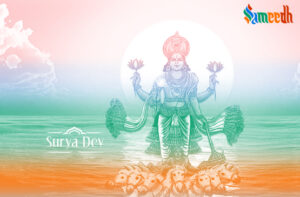“Surya Dasha” refers to the planetary period or cycle associated with the Sun (Surya) in Vedic astrology. In the Vimshottari Dasha system, which is one of the most widely used in Vedic astrology, Surya Dasha is typically a six-year period. The Vimshottari Dasha system divides a person’s life into major planetary periods, each ruled by a specific planet, and Surya is one of these ruling planets.

During the Surya Dasha, the energy and influences associated with the Sun are believed to play a significant role in shaping various aspects of an individual’s life. Although the Sun is a star, it is considered a prominent Graha in navagrahs. It represents a male in the form of an authoritative father figure as the Sun is known to be the ruler of all other planets. The Sun is associated with qualities such as authority, leadership, vitality, self-expression, and the father in Vedic astrology.
The Sun is the centre of the solar system, extending to central supreme roles such as that of kings, leaders, central government etc. It rules over the zodiac sign Leo. Here’s a general overview of what may happen during Surya Dasha:
- Sun’s Significations: The Sun is associated with qualities such as authority, leadership, vitality, self-expression, father, and government. During Surya Dasha, these themes may become prominent in a person’s life.
- Career and Recognition: The Sun is often linked to one’s career, and Surya Dasha may bring opportunities for leadership roles, recognition, and success in professional endeavors. There could be a focus on personal growth and achievements.
- Health and Vitality: The Sun is also associated with health and vitality. Depending on the placement of the Sun in the natal chart, individuals may experience periods of increased energy and well-being or, conversely, may need to pay attention to health-related matters.
- Father and Authority Figures: The Sun represents the father in astrology. During Surya Dasha, relationships with one’s father or father figures may become more prominent. Changes or events related to authority figures may also occur.
- Self-Expression and Creativity: Surya Dasha may bring opportunities for individuals to express themselves creatively and shine in areas where their unique talents and skills can be showcased.
- Spiritual Growth: The Sun is associated with spiritual illumination. Some individuals may experience a heightened interest in spiritual pursuits, self-discovery, or a deeper understanding of their life’s purpose during this period.
- Remedies and Challenges: Individuals may engage in specific remedies or practices to strengthen the positive effects of the Sun and mitigate challenges. These remedies can include mantra chanting, wearing astrological gemstones, and participating in charitable activities.
- Gemstone Associated: Ruby, also known as Manik, is a powerful gemstone associated with the sun in Vedic astrology. Wearing a high-quality ruby can enhance confidence, increase vitality, and improve leadership qualities.
It’s important to note that astrology, including the interpretation of dashas like Surya Dasha, is based on cultural and traditional beliefs rather than scientific evidence. Individuals may choose to explore or dismiss astrological insights based on their personal beliefs and preferences. If you’re interested in understanding the potential influence of Surya Dasha in your own life, consulting with a qualified Vedic astrologer can provide a more personalized and detailed analysis based on your birth chart.